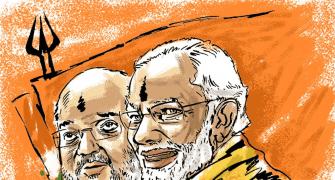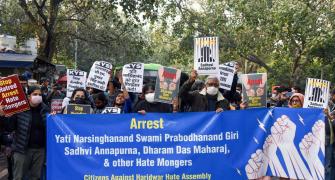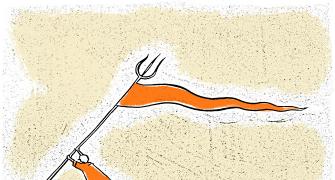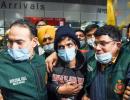Our demonisation and dehumanisation of minorities and especially Muslims is so complete that calls for the abduction of and sexual violence against Muslim girls are acceptable in our society today and can be made in public spaces.
The damage we have done to India internally and externally will be lasting, warns Aakar Patel.

Is it safe for women to be alone on India's roads and do they feel constantly threatened and fearful of their safety?
To know the answer to this, I put this question to 50 men who assured me that women felt safe and there was no problem.
Of course, the men had no idea whether this was actually the case because they had never faced the situation themselves.
Who should we ask if women feel safe? Women, of course.
The world is concerned today that India is encouraging calls for genocide.
The Economist, the world's most respected English publication, carried a report in its 15th January edition headlined: 'Playing with fire: India's government is ignoring, and sometimes even encouraging, hatred of minorities'.
The same day CNN ran a story headlined: 'India's Hindu extremists are calling for genocide against Muslims. Why is little being done to stop them?'
A few days before that the New York Times carried the headline: 'As Hindu Extremists Call for Killing of Muslims, India's Leaders Keep Silent'.
In London, The Times headline was 'Lawyers write to India's chief judge over Hindu hate speech against Muslims'. Time magazine has carried an article: 'Is India Headed for an Anti-Muslim Genocide?'
I could go on, but this much is perhaps sufficient to know that this is what the world is saying about us.
The reports are not mere opinion pieces.
They refer to events in our country and the attacks on India's Christians and Muslims in recent weeks and the inaction of the government.
After the world voiced its alarm an FIR was filed against those who openly called for the mass murder of Muslims at a Hindu function in Haridwar.
And even after it was filed, arrests were slow in coming and only after external pressure.
The government has brushed aside the allegation that it is encouraging violence and does not accept that India has become less safe for Muslims under Hindutva and the BJP.
The question is whether that is true and to know the answer to that we have to ask those who feel threatened and insecure.
Not those who, according to the rest of the world, are issuing and encouraging the threats.
To know if Muslims feel concerned and afraid we have to ask Muslims.
And since I have, I can tell you that they do feel concerned and afraid about what we have done and are doing to our country.
And they have reason to feel worried because we have given them that reason.
The most obscene things can be said about them today in public with no fear of shame or punishment.
The lack of fear of punishment comes from a ruling party which does not pretend to conceal what it thinks of minorities.
The lack of shame emanates from the fact that we have desensitised India society.
Our demonisation and dehumanisation of minorities and especially Muslims is so complete that calls for the abduction of and sexual violence against Muslim girls are acceptable in our society today and can be made in public spaces.
The damage we have done to India internally and externally will be lasting.
This is because the world will not stop talking about it merely because we have denied it, and what is happening will continue because the ruling party sees it as being in its political interest.
The attorney general of India has approved sanction for a Hindu priest to be tried for contempt of court.
'I find that the statement made by Yati Narsinghanand that 'those who believe in this system, in these politicians, in the Supreme Court and in the Army will all die the death of a dog' is a direct attempt to lower the authority of the Supreme Court in the minds of the general public.'
This is what the attorney general has said after an activist sent him a letter seeking his sanction.
Why is this not something the government itself did? The answer lies in reflecting on what the outside world is saying about us.
That the Union government and the ruling party are unconcerned about such calls made in public.
I have been writing for three decades but have not seen a time as this when there is a loss of control over what is said in the public domain.
I have also seen, as many of us have, the results of what happens on the streets of our cities when violence against communities is encouraged.
We are on dangerous ground and the world is worried for us.
It would be wise if we listened to what they are saying and step back from the precipice on which we find ourselves.
It is not safe to be dismissive about words like genocide, but unfortunately that is what India is doing today.
Aakar Patel is a columnist and writer and you can read Aakar's earlier columns here.
Feature Presentation: Aslam Hunani/Rediff.com










